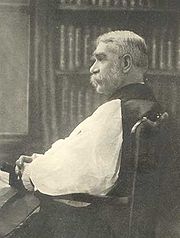
Alfred Robert Tucker
Encyclopedia

Early days
Tucker was born in 1849 and grew up in the Lake DistrictLake District
The Lake District, also commonly known as The Lakes or Lakeland, is a mountainous region in North West England. A popular holiday destination, it is famous not only for its lakes and its mountains but also for its associations with the early 19th century poetry and writings of William Wordsworth...
in England. Following in the footsteps of his family, he became an artist, exhibiting at the Royal Academy.
Church life
In 1879, Tucker became a mature student at Oxford University. This was unusual for an evangelical ordinand of his time, as by far the greater proportion of evangelical students went to Cambridge. In 1882, he was ordained curate in Bristol, then at St Nicholas' Church, DurhamSt Nicholas' Church, Durham
St Nicholas' Church, commonly known as St Nic's, is a Church of England place of worship located on Durham marketplace and is the city's civic church...
before being sent out in 1890 by the Church Mission Society
Church Mission Society
The Church Mission Society, also known as the Church Missionary Society, is a group of evangelistic societies working with the Anglican Communion and Protestant Christians around the world...
to become the third bishop of Eastern Equatorial Africa.
Tucker's style was, notably for this era, one of working with the culture rather than trying to replace it with European attitudes. He was quoted in 1908 saying, "We are pretty convinced in our mind that we have everything to give and nothing to receive; everything to teach and nothing to learn; moreover we find it very difficult to believe that there is anything good in the pagan races of Africa." He was very much in favour of native costume being used for clergy rather than European cassocks and robes. He argued for African churches to have autonomy, although he continually returned to England for more missionaries, possibly hoping for them to undertake support roles within the church structure rather than the leadership positions that they assumed.
His approach to the evangelisation of Uganda had three phases: conversion of individual African men; church planting; and finally, education.
Latter years
In 1911, Tucker returned to DurhamDurham
Durham is a city in north east England. It is within the County Durham local government district, and is the county town of the larger ceremonial county...
where he spent his days as a canon of Durham Cathedral
Durham Cathedral
The Cathedral Church of Christ, Blessed Mary the Virgin and St Cuthbert of Durham is a cathedral in the city of Durham, England, the seat of the Anglican Bishop of Durham. The Bishopric dates from 995, with the present cathedral being founded in AD 1093...
. He died in 1914 and was buried outside the Cathedral, where a tall Celtic cross marks his grave.
Bishop Tucker Theological College
The year before Tucker died, Uganda's first theological college was formed. On his death, it was named Bishop Tucker Theological College. In 1997, it became Uganda Christian UniversityUganda Christian University
Uganda Christian University is a private church-founded university administered by the Church of Uganda .-Location:The main campus of the university, with approximately 6,500 students, is located in the town of Mukono, approximately , by road, east of Uganda's capital city, Kampala, on the...
. In 2004, the University's theology faculty was named "The Bishop Tucker School of Divinity and Theology."

